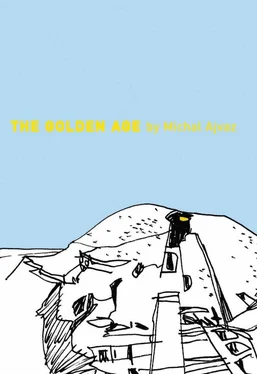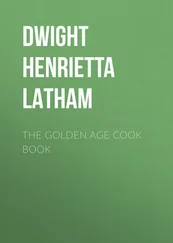Michal Ajvaz - The Golden Age
Здесь есть возможность читать онлайн «Michal Ajvaz - The Golden Age» весь текст электронной книги совершенно бесплатно (целиком полную версию без сокращений). В некоторых случаях можно слушать аудио, скачать через торрент в формате fb2 и присутствует краткое содержание. Год выпуска: 2010, Издательство: Dalkey Archive Press, Жанр: Современная проза, на английском языке. Описание произведения, (предисловие) а так же отзывы посетителей доступны на портале библиотеки ЛибКат.
- Название:The Golden Age
- Автор:
- Издательство:Dalkey Archive Press
- Жанр:
- Год:2010
- ISBN:нет данных
- Рейтинг книги:4 / 5. Голосов: 1
-
Избранное:Добавить в избранное
- Отзывы:
-
Ваша оценка:
- 80
- 1
- 2
- 3
- 4
- 5
The Golden Age: краткое содержание, описание и аннотация
Предлагаем к чтению аннотацию, описание, краткое содержание или предисловие (зависит от того, что написал сам автор книги «The Golden Age»). Если вы не нашли необходимую информацию о книге — напишите в комментариях, мы постараемся отыскать её.
is Michal Ajvaz’s greatest and most ambitious work.
The Golden Age
The Golden Age — читать онлайн бесплатно полную книгу (весь текст) целиком
Ниже представлен текст книги, разбитый по страницам. Система сохранения места последней прочитанной страницы, позволяет с удобством читать онлайн бесплатно книгу «The Golden Age», без необходимости каждый раз заново искать на чём Вы остановились. Поставьте закладку, и сможете в любой момент перейти на страницу, на которой закончили чтение.
Интервал:
Закладка:
“Which probably means that not long before the yacht had been involved in some kind of adventure which had damaged its hull, and stories of this adventure were spreading across the town.” Baumgarten was trying to interpret the scene in the picture so that he could move the girl’s account forward. Watching the luminous, phantom-like purple snowflakes, it seemed to him for a moment that he knew their full repertoire of dances, which they repeated ad infinitum.
The wrecking of the Zephyrus
“That’s right,” said the thief, nodding enthusiastically. “In one of the streets above the harbour it was possible to look through an open window into a modestly-appointed room. On a shelf on the wall I could see a number of exotic sculptures. There was a suntanned, fair-haired man of about thirty sitting at a desk; he looked like a foreigner who had lived a long time in the south. On the right-hand side of the desk there was a typewriter with rounded keys and a black case on which ‘Underwood’ was written in ornamental gold letters, and beneath this, in smaller letters, ‘Standard Four Bank Keyboard.’ Towards the back of the desk there were several pots containing pencils and pens. Against one of these a plastic frame was resting; this contained a black-and-white photograph of a young woman, laughing, sitting on a deck chair next to a swimming pool. On the left-hand side of the desk there was a folder, out of which sheets of paper covered in dense writing were spilling from the top and bottom. The folder bore the legend ‘Journey,’ which was almost obscured by the kind of drawings people do unconsciously and abstractedly; these drawings were of elephants, crocodiles, and birds of paradise among a lot of grotesque shapes and some names and telephone numbers. All the spaces were filled in with a fancy, complicated net — rather like a spider’s web — and all the figures, letters and numbers were ensnared in this. Next to the scribbled-on folder there was a glass ball used as a paperweight, where one could read distorted letters of various sizes which made up the words ‘Black Hermaphrodite will be with you very soon…’
“All these objects created a kind of rampart along three sides of the desk. In the space this marked out, thirty-eight nine-by-thirteen colour photographs were laid out like cards in a game of patience. The man was bent over these in an attitude of contemplation. Many of the photographs showed the Zephyrus . In the one at the top left-hand corner she was at anchor in the town’s harbour and her paint, white and undamaged, was gleaming in the early-morning sun. Many of the other shots showed the surface of the sea in various guises — gleaming and dark, undulating and flat, whirling restlessly, languid and passive, broken into many small, sharp-spined waves, gathered in a stodgy, formless mass, neurotically tense, listlessly dormant. Regardless of the sea’s guise, in each of the photos it was scored through with the white lines of marine ropes. In some shots the figure of a man was visible on deck. It was the man sitting at the desk. Apparently he used a self-release mechanism. As far as I could tell, he journeyed in the boat alone.
“One of the photographs showed the yacht lying pitiful on a sandy beach with a hole in its side, its backdrop the dark wall of a jungle of palms. Others provided various views of the coast and interior of an island which appeared to be uninhabited. There were several of the entrance to a cave which was overgrown with lianas. But the majority of the photos there on the desk were of the inside of the cave, its gloomy recesses lit harshly by an electric flash. Evidently the cave had many years earlier been transformed into a speos. Pictures of gods emerged out of the darkness, carved in the rock of the walls. There were inscriptions in an unknown, angular script, altars practically covered with sculptures and objects whose meaning could only be guessed at. Among them I noticed the figurines which now stood on the shelf at the man’s back. All these things led me to believe that the man at the desk was the owner of the Zephyrus , in which he had embarked on a solitary expedition on the seas…”
“…and washed up on an uninhabited island, where he discovered in the jungle a hitherto unknown speos. And now he was writing a book about his adventures and discoveries, which the town’s locals were already regaling the tourists with. At the moment captured by the master from Berlin he was in the process of choosing the photographs for its illustrated supplement.” These last words were from Baumgarten, in whom stretches of apathy and moments of interest in the monstrous picture were fighting for the upper hand.
“I didn’t find anything else of interest in the traveller’s room, so I turned my attentions to the streets of the town,” the girl continued. “My eyes travelled around the maze of streets in the quarter around the harbour until they reached a grouping of houses on a rise hard by what remained of the town’s mighty ramparts. Beyond the half-open shutters at one of the windows I recognized the face of the girl in the black-and-white photograph on the traveller’s desk. She was lying in bed with her eyes closed, with a strip of light across her face which had slipped past the shutters and extended across the otherwise dark room, illuminating a closed book on a bedside table to the left of the sleeper’s head. I wasn’t able to read its title because on top of it there was an open cigarette packet with three cigarettes in it. But I did see a strip of paper sticking out of it which had Chinese characters written on it. To the right, the sleeve of light passed over the hirsute chest of a rather plump young man, who was half sitting, half lying in the bed next to the woman of the photograph. His face was melting into the gloom which enveloped the rest of the room. Otherwise there were only two weak points of light — a red spot on the man’s face — apparently the glowing end of a cigarette — and then a suspicious grey sheen in the half-open handbag of the sleeping girl. Might this be the barrel of a small ladies’ revolver?
“I saw the next scene in the series of pictures connected with the journeying of the Zephyrus through the window of a building which looked like an abandoned Venetian palace rebuilt as a residential house. The window revealed a room whose back wall was covered by a bookcase. There were three men in the room. One of them had a well-groomed grey beard and was sitting in a deep armchair whose covers bore pictures of romantic castles and roses. He was showing something on a sheet of paper to a thin young man in glasses, who was leaning towards his elder in an attitude part curious, part servile. Written in a column on the left-hand side of the sheet were the pointed letters I’d seen in the photographs of the speos; the right-hand side was covered in letters in Latin script. On the windowsill there sat a third man, whose face was obscured. He was reading with interest something someone had written in very small letters in a large notebook. This was written in the Latin script, although there were question marks next to some of the words, and brackets which contained groups of the angular letters.”
“But you’ve already told me about this room. You said that it was part of the story of the turbine and the margarine,” recalled Baumgarten, in whom sleepiness and coldness were struggling against a desire to know the sense of all these long-winded descriptions.
“Of the peanut butter, not the margarine. At least you know now how the stories in the different spaces intersected with one another. I attempted to draw a chart showing how the individual scenes were part of a system. What I ended up with was pretty similar to a plan of the Paris métro. The places where the stories crossed corresponded to interchange stations. And the plots developed in the painted scenes were of a great variety of genres: in the picture I found stories of adventure, stories of love, detective stories, surrealistic stories, stories moral and immoral, mystical, pornographic, humanistic, sado-masochistic and didactic stories, stories of l’art pour l’art , satanist, socialist and Buddhist stories, stories sophisticated and childish, stories of incest, cynical stories, stories sentimental and stories naturalistic. The only thing in this room which belonged in the story of the turbine was the reflection in a mirror of the room next to it, and this had nothing at all to do with the story of the wrecking of the Zephyrus .
Читать дальшеИнтервал:
Закладка:
Похожие книги на «The Golden Age»
Представляем Вашему вниманию похожие книги на «The Golden Age» списком для выбора. Мы отобрали схожую по названию и смыслу литературу в надежде предоставить читателям больше вариантов отыскать новые, интересные, ещё непрочитанные произведения.
Обсуждение, отзывы о книге «The Golden Age» и просто собственные мнения читателей. Оставьте ваши комментарии, напишите, что Вы думаете о произведении, его смысле или главных героях. Укажите что конкретно понравилось, а что нет, и почему Вы так считаете.












